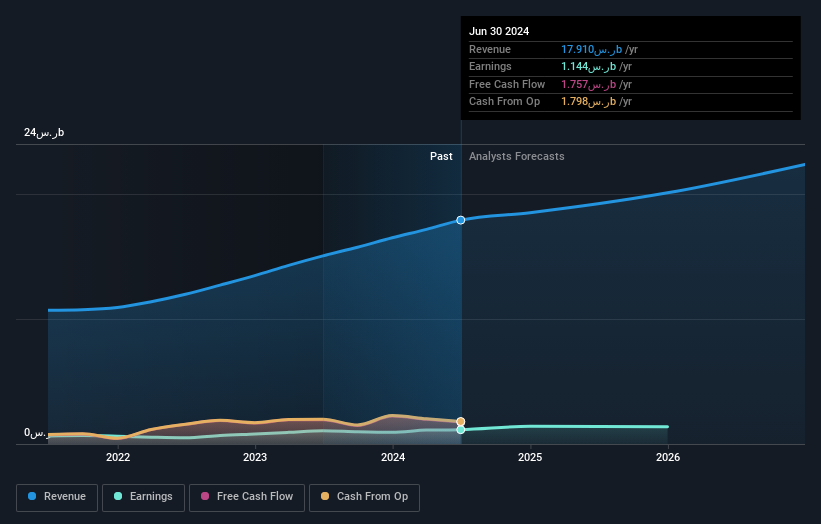- Saudi Arabia
- /
- Insurance
- /
- SASE:8210
Private companies account for 48% of Bupa Arabia for Cooperative Insurance Company's (TADAWUL:8210) ownership, while individual investors account for 42%

Key Insights
- The considerable ownership by private companies in Bupa Arabia for Cooperative Insurance indicates that they collectively have a greater say in management and business strategy
- A total of 3 investors have a majority stake in the company with 50% ownership
- Analyst forecasts along with ownership data serve to give a strong idea about prospects for a business
Every investor in Bupa Arabia for Cooperative Insurance Company (TADAWUL:8210) should be aware of the most powerful shareholder groups. We can see that private companies own the lion's share in the company with 48% ownership. That is, the group stands to benefit the most if the stock rises (or lose the most if there is a downturn).
Meanwhile, individual investors make up 42% of the company’s shareholders.
In the chart below, we zoom in on the different ownership groups of Bupa Arabia for Cooperative Insurance.
Check out our latest analysis for Bupa Arabia for Cooperative Insurance

What Does The Institutional Ownership Tell Us About Bupa Arabia for Cooperative Insurance?
Many institutions measure their performance against an index that approximates the local market. So they usually pay more attention to companies that are included in major indices.
We can see that Bupa Arabia for Cooperative Insurance does have institutional investors; and they hold a good portion of the company's stock. This suggests some credibility amongst professional investors. But we can't rely on that fact alone since institutions make bad investments sometimes, just like everyone does. When multiple institutions own a stock, there's always a risk that they are in a 'crowded trade'. When such a trade goes wrong, multiple parties may compete to sell stock fast. This risk is higher in a company without a history of growth. You can see Bupa Arabia for Cooperative Insurance's historic earnings and revenue below, but keep in mind there's always more to the story.

Hedge funds don't have many shares in Bupa Arabia for Cooperative Insurance. Our data shows that The British United Provident Association Limited is the largest shareholder with 43% of shares outstanding. With 5.0% and 2.0% of the shares outstanding respectively, Nazer Group Ltd. and The Vanguard Group, Inc. are the second and third largest shareholders.
After doing some more digging, we found that the top 3 shareholders collectively control more than half of the company's shares, implying that they have considerable power to influence the company's decisions.
While studying institutional ownership for a company can add value to your research, it is also a good practice to research analyst recommendations to get a deeper understand of a stock's expected performance. There are plenty of analysts covering the stock, so it might be worth seeing what they are forecasting, too.
Insider Ownership Of Bupa Arabia for Cooperative Insurance
The definition of company insiders can be subjective and does vary between jurisdictions. Our data reflects individual insiders, capturing board members at the very least. Company management run the business, but the CEO will answer to the board, even if he or she is a member of it.
I generally consider insider ownership to be a good thing. However, on some occasions it makes it more difficult for other shareholders to hold the board accountable for decisions.
Our most recent data indicates that insiders own less than 1% of Bupa Arabia for Cooperative Insurance Company. We do note, however, it is possible insiders have an indirect interest through a private company or other corporate structure. It is a very large company, so it would be surprising to see insiders own a large proportion of the company. Though their holding amounts to less than 1%, we can see that board members collectively own ر.س45m worth of shares (at current prices). Arguably recent buying and selling is just as important to consider. You can click here to see if insiders have been buying or selling.
General Public Ownership
The general public, who are usually individual investors, hold a 42% stake in Bupa Arabia for Cooperative Insurance. This size of ownership, while considerable, may not be enough to change company policy if the decision is not in sync with other large shareholders.
Private Company Ownership
Our data indicates that Private Companies hold 48%, of the company's shares. It's hard to draw any conclusions from this fact alone, so its worth looking into who owns those private companies. Sometimes insiders or other related parties have an interest in shares in a public company through a separate private company.
Next Steps:
I find it very interesting to look at who exactly owns a company. But to truly gain insight, we need to consider other information, too. Consider risks, for instance. Every company has them, and we've spotted 1 warning sign for Bupa Arabia for Cooperative Insurance you should know about.
If you would prefer discover what analysts are predicting in terms of future growth, do not miss this free report on analyst forecasts.
NB: Figures in this article are calculated using data from the last twelve months, which refer to the 12-month period ending on the last date of the month the financial statement is dated. This may not be consistent with full year annual report figures.
Valuation is complex, but we're here to simplify it.
Discover if Bupa Arabia for Cooperative Insurance might be undervalued or overvalued with our detailed analysis, featuring fair value estimates, potential risks, dividends, insider trades, and its financial condition.
Access Free AnalysisHave feedback on this article? Concerned about the content? Get in touch with us directly. Alternatively, email editorial-team (at) simplywallst.com.
This article by Simply Wall St is general in nature. We provide commentary based on historical data and analyst forecasts only using an unbiased methodology and our articles are not intended to be financial advice. It does not constitute a recommendation to buy or sell any stock, and does not take account of your objectives, or your financial situation. We aim to bring you long-term focused analysis driven by fundamental data. Note that our analysis may not factor in the latest price-sensitive company announcements or qualitative material. Simply Wall St has no position in any stocks mentioned.
About SASE:8210
Bupa Arabia for Cooperative Insurance
Engages in insurance business in the Kingdom of Saudi Arabia.
Outstanding track record with excellent balance sheet and pays a dividend.
Market Insights
Community Narratives



